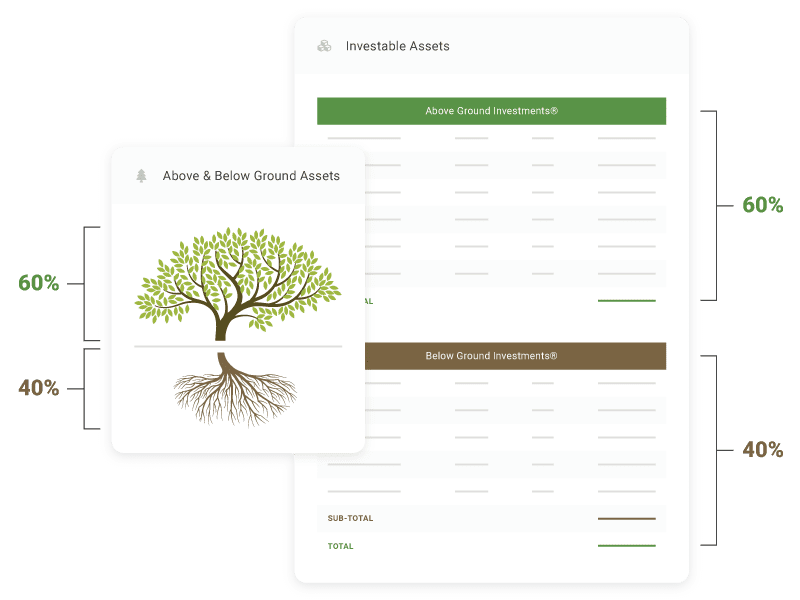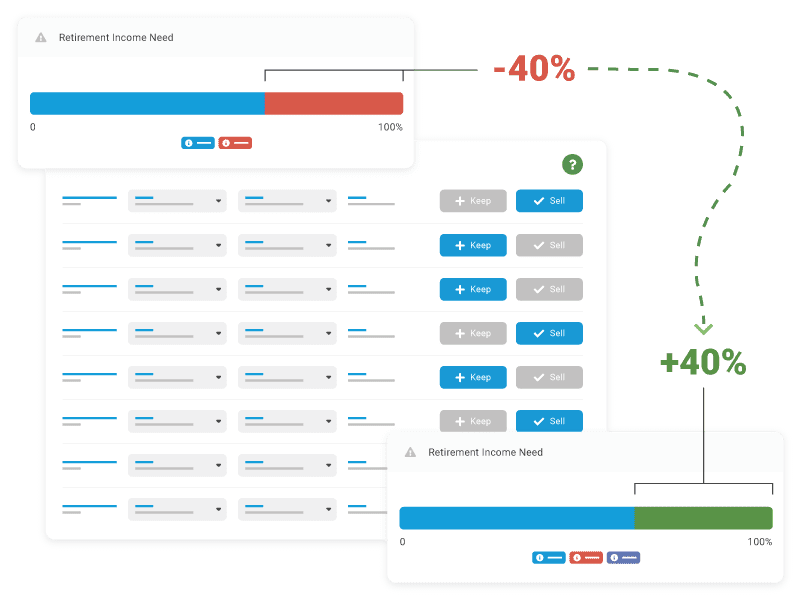Are you considering investing your money but don’t know where to start?
From stocks to mutual funds to a properly diversified investment portfolio…investing can be an intimidating prospect, but with the right knowledge and advice, it can also be incredibly rewarding. In this blog post, we’ll discuss how to start investing and when to seek help from a certified financial planner if you aren’t experiencing the desired results.
How to Start Investing
Investing is one of the most reliable ways to grow your money over time. By putting your money into investments that have the potential to increase in value, you can build wealth and achieve long-term financial success. That said, it’s important to understand some basic steps to take and key points to remember when deciding to invest on your own.

How to get started investing and when should you start investing?
When Should You Start Investing?
It’s never too late to start investing. The good news is you’ve taken your first step toward investing. Unfortunately, many people have difficulty getting started because they are either intimidated, don’t want to risk money, or would rather spend it. Investing involves risk, but the rewards outweigh the immediate satisfaction of splurging on a purchase.
However, it’s important to point out that the earlier you get started in life, the better, due to the power of compounded interest. Compound interest means that as your money grows in an account, it will generate more money based on a percentage of the total amount. The longer you leave your money in an investment account, the more time it has to compound and grow exponentially. This means that if you wait 10 years to invest instead of starting right away, you could be missing out on thousands or even millions of dollars over time.
Determine Your Investment Goals
Before you begin investing, you should take some time to consider what your financial goals are and how much risk you’re willing to take on. This will help you make informed decisions about where and how much money you should invest. For example, when you’re young, you may not have much extra income to invest, but starting small is better than not starting at all.
If you’re a more seasoned professional, you may have to reduce your spending to find funds to invest. Regardless of your situation, be honest with yourself about determining your financial goals and your overall level of risk aversion. Investing is a long game, and it can take time to recover if you underestimate your willingness to curb your spending or expect a safer investment with smaller yields to provide big results.
Research Your Investment Options
There are a lot of options when determining where to put your money, so do your research before deciding which one(s) is right for you. For instance, the stock market tends to require more consistent work and research, but also offers higher rewards than bonds. Additionally, you may want to consider researching different types of accounts—such as a 401k plan, IRA, exchange-traded funds, or mutual funds—to see if they might be beneficial for your situation.
Another common question financial advisors get is about cryptocurrency. Which is better, cryptocurrency or stocks? From how they work to how to invest, researching your options and furthering your understanding of both can be crucial to the investment process. You may also find yourself asking, which is better, saving or investing? There are a lot of different strategies that people use to try and secure their future.
Remember, there is a wealth of information online. As you educate yourself on the various options be sure they align with your personal goals. After all, part of researching is understanding what methods work best for you and what you hope to achieve.

Start Small & Manage Your Risk
Start Small & Manage Your Risk
It’s natural to want to get started right away when beginning to invest, however, it’s important not to go overboard too quickly. As you know, different investments come with different levels of risk and reward. Therefore, start small by investing only what you feel comfortable risking and gradually increase your portfolio size as you become more comfortable with the process. Additionally, be sure to diversify your investments across multiple asset classes in order to reduce risk — no matter how small or large your portfolio may be at any given moment in time.
Keeping an Eye on How Your Investments Progress
Once you’ve invested money, the next step is to track its progress regularly and adjust accordingly (e.g., buying more shares when prices dip or selling when prices reach an all-time high). This can help ensure your investments are achieving their intended purpose (e.g., retirement savings). If you’ve placed your money in a stock, it is wise to pay attention to news regarding the company’s business, changes in management, etc.
Understanding the Tax Advantages of Investing
Investing also has its tax advantages, however, you won’t be able to take advantage of them until retirement age or older. For example, contributions in 401(k) accounts are pre-taxed which means they won’t count towards your taxable income when filing taxes each year—and any earnings made from those investments also won’t be taxed until withdrawal.
In addition, IRAs are also eligible for certain tax deductions depending on your income level and contribution amount each year. Taking advantage of these tax breaks now can save investors hundreds or thousands of dollars each year in taxes alone. If you’re looking for more ways to save on taxes during retirement we have 5 considerations to help you reduce your taxes.

When to seek help from a financial advisor
When to Seek Help
While there are rewards to investing on your own it’s important to understand when it may be time to transition from DIY investing to working with a financial professional. Deciding when to make the switch can be difficult, but there are certain signs that can be an indication of when it’s time to make the switch. Here is an overview of how to successfully transition from investing on your own to using a good financial advisor and the role they can play in the process.
Why Make the Transition
There are several reasons why transitioning from DIY investing to working with a certified financial planner makes sense. A financial advisor can provide you with experienced investment advice, guidance on asset allocation, sophisticated investment strategies, and take the emotional component out of financial decisions.
The Role of a Financial Advisor
By developing a comprehensive financial planning that factors in all the pieces of your overall financial picture, such as budgeting, estate planning, retirement planning, and tax planning, a financial advisor can create a customized plan based on your current financial situation, goals, and risk tolerance. They also do so by taking into account your age, income level, and tax status.
One important thing to keep in mind is to choose a financial advisor who offers services that best suit your needs. Financial advisors can also help with all sorts of investments including:
- stocks
- bonds
- mutual funds
- real estate investments
- retirement accounts
- college planning (e.g., 529s)
- tax planning strategies
- insurance policies (both life insurance and disability insurance)
- debt management programs (e.g., credit counseling)
- charitable giving strategies (e.g., trust funds)
- estate planning solutions.
Ultimately, seeking the financial advice and perspective of a financial advisor who has years of experience can offer you peace of mind that you’re on the right track.
When to Use a Financial Advisor
If you’re considering using a financial advisor for the first time you’ll want to make sure you’re choosing the right financial advisor for your needs. Not only will you want to educate yourself on their credentials, experience, and services, but you’ll want to understand their investment style and their communication preferences as well.
When working with the right financial advisor it can mean getting the assistance you need when making complicated investment decisions or creating a comprehensive financial plan. They’ll also be able to provide you with investment advice. If you’re having trouble understanding how to invest and managing your finances, or if you have specific questions about topics such as Social Security, diversification of your portfolio or other financial products having access to someone with specialized knowledge can greatly benefit you.

Which investment is right for me?_Kaizen Wealth
You’re Ready to Start Working With a Financial Advisor. Now What?
Prior to your first meeting with your advisor, make sure that you are equipped to discuss both your current financial situation as well as your short-term and long-term goals. This will allow them to develop an appropriate investment strategy tailored specifically for you.
The best advisors can help to explain their investment strategies in terms that anyone can understand—even those who may not be familiar with investing terminology. A good financial advisor can help to answer your financial questions, should also be willing to provide detailed explanations about why certain strategies might be better suited for your investment goals over others, and explain how certain financial products are more beneficial to you as you’re nearing retirement.
The Bottom Line
Investing on your own can seem overwhelming at first, but with patience and diligence, anyone can become successful. Do your research ahead of time to further your knowledge of the different types of investments that may be best suited for your goals.
If at any point in your investing experience you need assistance making complex investment decisions and understanding when they’re appropriate don’t hesitate to seek the help of a financial advisor. It can make all of the difference in being successful or failing.



